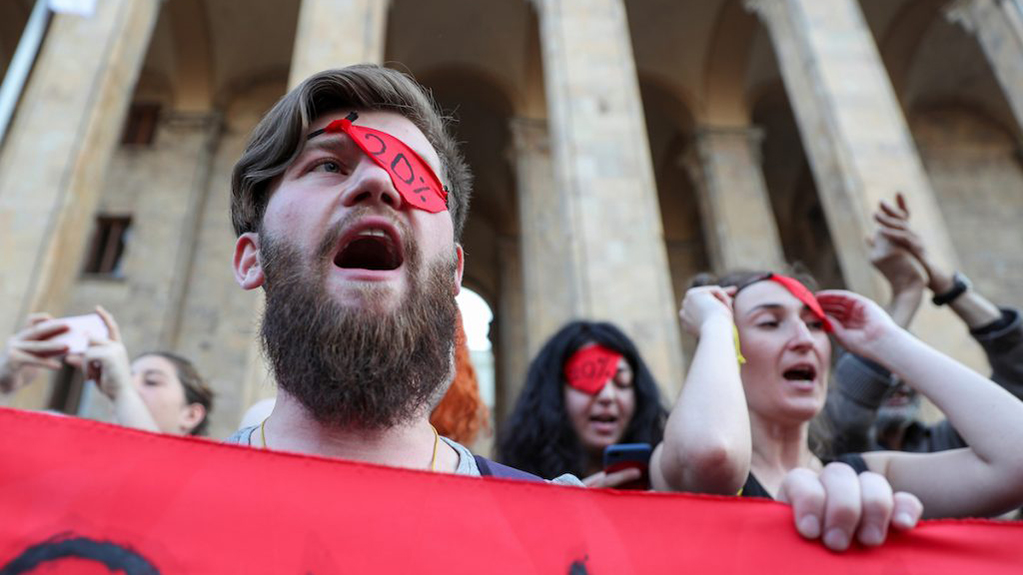The European Court of Human Rights found a procedural violation of the right guaranteed by the European Convention in the case of the June 20-21, 2019 rally raid and ordered a total of 153 600 euros to be paid to the affected Georgian citizens as compensation for moral damages. Based on the court's decision, Article 3 of the Convention, which implies the state's obligation to investigate allegations of torture, inhuman or degrading treatment or punishment, has been violated.
News
In the case TSAAVA AND OTHERS v. GEORGIA, the appellants were 26 Georgian citizens. It pertains to the crackdown on the rally in front of the Parliament building on June 20-21, 2019, in Tbilisi. The large-scale protest was prompted by Russian Duma member Sergey Gavrilov occupying the seat of the Georgian Parliament chairman and delivering a speech in Russian.
The plaintiffs relied on Article 3 of the European Convention (prohibition of inhuman or degrading treatment) and argued that their injuries resulted from the excessive use of force and that the investigation into the matter was ineffective. The applicants also referred to Articles 10 (freedom of expression), 11 (freedom of assembly and association), and 13 (right to an effective remedy) of the Convention. The European Court refrained from making a decision regarding these articles, considering the ongoing investigation in Georgia and the need to further clarify the factual elements. The court did not find a violation of Article 38 (adjudication of the case), which some applicants pointed out.
“the applicants could not identify the officers whose shots had resulted in their injuries. However, the Court takes into account that the majority of the officers who used rubber bullet rifles had their faces covered and were located in an elevated position, behind the police cordon, further away from the demonstrators. This may have rendered their identification by victims rather difficult. Indeed, even some of the officers could not recognise their colleagues
However, it was primarily for the authorities planning and implementing such a large-scale police operation to ensure that the identification of officers suspected of ill-treatment would not be rendered impossible. Namely, where the competent national authorities deploy masked police officers to maintain law and order or to make an arrest, those officers should be required to visibly display some distinctive insignia, such as a warrant number. The display of such insignia would ensure their anonymity, while enabling their identification and questioning in the event of challenges to the manner in which the operation was conducted.
In the present case, in the absence of such identifying insignia for the officers, the investigative measures open to the authorities to establish the identities of the persons responsible for the alleged use of excessive force causing ill-treatment became increasingly important,” court's judgment says.
The court notes that although the investigation has been ongoing for more than four and a half years and no conclusion has been reached, the authorities did not make sufficient efforts to determine what happened and to identify possible suspects:
“For instance, although the eleventh applicant in application promptly requested after the incident that recordings from the video cameras located around the Parliament yard be obtained by the authorities, it is unclear why such material could not be obtained. Similarly, while the identity of the officers involved in the arrest and escorting of the third, fifth and seventh applicants in application was known to the authorities, it is unclear why no conclusions have been drawn in respect of their conduct during the contested events.”
As per the European Court of Human Rights' decision, the state must pay the following amounts to the applicants within three months from the date of the decision:
- Kurdovanidze, Gomuri, Sulashvili, and Chankseliani are each awarded 15 000 euros, plus any taxes.
- Tsaava, Kmuzov, Svanadze, Baghashvili, Nemsadze, Vakhtangadze, Khozrevanidze, Koshkadze, Muradov, Chumburidze, Abashidze, Diasamidze, Shekhiladze, Fochkhidze, Giorgadze, Sharvashidze, Didberashvili, Berikashvili are each awarded 5 000 euros, plus any taxes.
- Khvadagian and Chikviladze are each awarded 1 800 euros, plus any taxes.
The interests of 22 out of 26 applicants were represented by the Association of Young Lawyers of Georgia. According to the organization's chairman, Nona Kurdovanidze, these included 10 participants in the peaceful protest, 11 media representatives, and one individual who was accidentally present at the epicenter of the events. The chairman of GYLA noted that today's decision by the Strasbourg court is very important in the context of the ongoing actions against the Russian aw and serves as a summary of the systemic problems that still exist today.















